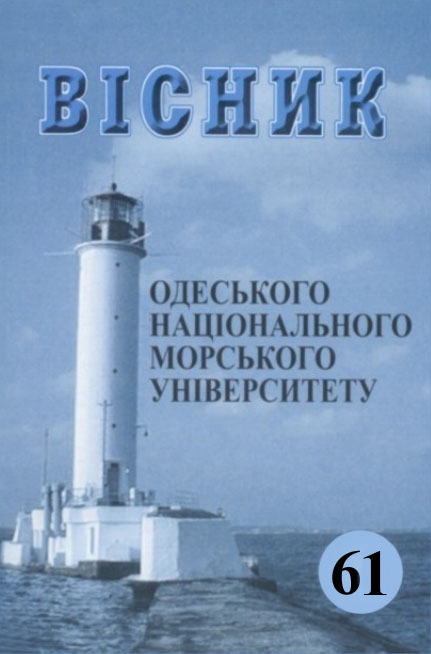Reduction of mechanical losses in medium-speed marine diesel engines by optimizing the operation of circulating lubrication systems
Main Article Content
Abstract
It is pointed out that the energy complexes of river and marine means of transport are complex structural objects, in operation of which it is necessary to provide not only requirements for obtaining efficient power and maintaining ecological parameters, but also a minimum level of mechanical losses during the conversion of input energy into useful work. According to the information search, structural and technological measures to reduce mecha-nical energy losses during the operation of marine diesels are based on: modification of the surfaces of the cylinder group, ensuring minimum fuel consumption, regeneration of the properties of the working surfaces of the main elements of the diesel. At the same time, the most accessible in the conditions of diesel operation is the optimization of the circulation of lubrication systems. The questions of ensuring the minimum level of mechanical losses in marine medium-speed diesel engines are considered. The results of determination of mechanical efficiency of Yanmar 6EY22AW diesel engine in the range of its load 35-80 % and various conditions of operation of its circulating lubrication system are presented. It is experimentally proven that the reduction of mechanical losses is estimated directly by the proportional increase in the mechanical efficiency of the diesel engine. This parameter when operating Yanmar 6EY22AW diesel without the use of surface additives in the circulating lubrication system and with a standard oil refill period is 0,2 %. The choice of the optimal mode of replenishment of the circulatory±80,3 system, as well as the addition to the total volume of the circulating system of the surface additive with the optimal concentration (the determination of which is carried out by preliminary laboratory studies), contributes to the increase of the mechanical efficiency of the diesel – that is, to reduce the mechanical losses and increase the effective power. With an optimum replenishment of the circulatory system (which according to experimental studies is 10 hours) and adding to the volume of the circulating lubricant additive system (with an optimum concentration of 0.1 % by the total volume of the system), it is possible 5,8-11,1 % reduction of mechanical losses. For Yanmar 6EY22AW marine diesel (which has been piloted), it achieves a mechanical efficiency of 0,2 %.±89,1
Article Details
References
2. Golikov V.A., Onishchenko О.А. (2017) Rozvytok suchasnoyi teoriyi i praktyky texnichnoyi ekspluataciyi morskogo i richkovogo flotu: koncepciyi, metody, texnologiyi [Development of modern theory and practice of technical exploitation of the sea and river fleet: concepts, methods, technologies]. Sudovye energeticheskie ustanovki : nauchno-tehnicheskij sbornik, no. 37, pp. 13-27.
3. Sagin S.V., Zablotsky Yu.V. (2011) Opredelenie tribotehnicheskih harakteristik poverhnostej po stepeni uporyadochennosti pristennyh sloev uglevodorodnyh zhidkostej [Determination of tribolo-gical characteristics of surfaces according to the degree of ordering of wall layers of hydrocarbon fluids]. Problemy texniky: naukovo-vyrobnychj zhurnal, no. 3, pp. 78-88.
4. Sagin S.V., Solodovnikov V.G. (2017) Estimation of Operational Properties of Lubricant Coolant Liquids by Optical Methods. International Journal of Applied Engineering Research, vol. 12, no. 19, pp. 8380-8391.
5. Sagin S.V., Matskevich D.V. (2011) Opticheskie harakteristiki granichnyh smazochnyh sloev masel, primenyaemyh v cirkulyacionnyh sistemah sudovyh dizelej [Optical characteristics of boun-dary lubricating layers of oils used in marine diesel circulating systems]. Sudovye energeticheskie ustanovki: nauchnotehnicheskij sbornik, no. 26, pp. 116-125.
6. Levchenko V.A., Popovskii A.Yu. (2000) Orientational ordering in 2, 6-lutidine near quartz surfaces modified by carbon. Journal of Molecular Liquids, vol. 85, no. 1-2, pp. 211-217.
7. Popovskii A.Yu., Sagin S.V. (2014) Kompleksnaya ocenka ekspluatacionnyh harakteristik smazochnyh uglevodorodnyh zhidkostej [Comprehensive performance assessment of lubricating hydrocar-bon fluids]. Avtomatizaciya sudovyh tehnicheskih sredstv: nauch-no-tehnicheskij sbornik, no. 20, pp. 74-83.
8. Popovskii A.Yu., Sagin S.V. (2016) Ocenka ekspluatacionnyh svojstv smazochno-ohlazhdayushih zhidkostej sudovyh tehnicheskih sredstv [Evaluation of the operational properties of cutting fluids of marine technical equipment]. Avtomatizaciya sudovyh tehnicheskih sredstv: nauchno-tehnicheskij sbornik, no. 22, pp. 66-74.
9. Zablotsky Yu.V., Sagin S.V. (2016) Enhancing Fuel Efficiency and Environmental Specifications of a Marine Diesel When using Fuel Additives. Indian Journal of Science and Technology, vol. 9, no. 46, pp. 353-362. DOI: 10.17485/ijst/2016/v9i46/107516.
